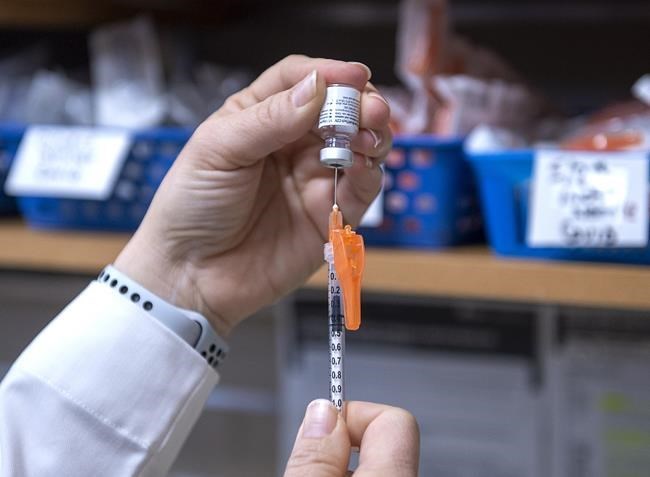OTTAWA — The National Advisory Committee on Immunization is standing by its emergency recommendation to extend timing of second doses of COVID-19 vaccines up to four months after the first, but says most Canadians will probably only wait half that long.
The panel is also keeping an eye on the latest reports, released Wednesday in Europe and the United Kingdom, on Oxford-AstraZeneca's vaccine and the risk of blood clots. NACI is awaiting further information from Health Canada before deciding if it needs to adjust its recommendation not to give AstraZeneca to people under 55.
"We made the decision out of an abundance of caution, while further investigations were ongoing," said Dr. Shelley Deeks, the vice-chair of NACI. "So we will now look at the new data."
Chair Dr. Caroline Quach-Thanh said NACI should be ready to provide any updated recommendations in less than a month.
Canada has been using the AstraZeneca vaccine for just a few weeks and fewer than a million doses have been injected. Health Canada has not reported any blood clots to date.
But the European Medicines Agency and the British Medicines and Healthcare Products Regulatory Agency both said Wednesday the link between the AstraZeneca vaccine and some rare blood clots caused by low platelet counts is becoming hard to dismiss even if they can't yet explain it.
The EMA said as of April 4 it had reports from the European economic area and the United Kingdom of 222 cases of clots in the brain and digestive system, caused when the body develops an immune response that attacks platelets. That is out of 34 million shots given.
The U.K. specifically reported 79 clots as of March 31, in men and women between 18 and 79 years of age. Nineteen of the cases were fatal. The U.K. said that is out of more than 20 million shots given.
AstraZeneca said in a statement it is working with regulators to add a blood clot risk warning to the vaccine but noted the World Health Organization said attributing the cause to the vaccine is "plausible but is not confirmed."
The company is "already working to understand the individual cases, epidemiology and possible mechanisms that could explain these extremely rare events."
The U.K. drug regulator didn't recommend limiting the vaccine's use, but the British version of NACI did, saying adults between 18 and 29 years old should be given Pfizer-BioNTech or Moderna.
The EMA likewise didn't recommend against using AstraZeneca on anyone. Executive Director Emer Cooke said the benefits still outweigh the risks because the threat from COVID-19 is even greater.
"COVID-19 is a very serious disease with high hospitalization and death rates and every day COVID is still causing thousands of deaths across the EU," said Cooke.
"This vaccine has proven to be highly effective, it prevents severe disease and hospitalization and it is saving lives."
The EMA said there have been some clots reported with the Johnson & Johnson vaccine, which uses similar technology as AstraZeneca. That vaccine is in early stages of use and only in the United States. Canada hasn't received any doses yet.
Canada expects to receive about 6.4 million doses of AstraZeneca by the end of June.
Canada's biggest vaccine sources remain the Pfizer-BioNTech and Moderna vaccines, with more than 22 million doses of Pfizer and almost 15 million Moderna expected by June 30. Blood clots have been reported in a handful of patients after being given those vaccines, but none were linked to the vaccine itself.
More than six million Canadians have now received at least one vaccine dose and the vaccination rate is accelerating as more deliveries arrive.
Quach-Thanh said NACI still believes it is going to be better to delay second doses up to four months, instead of three or four weeks, so more people can get a first dose faster. But she said she also think that wait will be cut to between two and 2.5 months as more doses are shipped.
Pfizer was tested as a two-dose vaccine given three weeks apart, and Moderna and AstraZeneca two doses, given four weeks apart.
On March 3 NACI issued a "rapid response statement" urging provinces and territories to expand that to up to four months to get more Canadians covered with one dose faster.
Deeks said the panel looked at clinical trials, "real-world evidence" of the vaccines in the general population, lab data and modelling that showed a single dose could significantly reduce deaths and hospitalizations from COVID-19. Vaccine science also typically shows immune responses improve if the wait between doses is longer, she said.
Data from Canada and the United Kingdom both showed one dose of vaccine was significantly reducing hospitalizations of the most elderly people, who were the first to be vaccinated.
"NACI's expert opinion also considered that within a global pandemic setting, reducing the risk of severe disease outcomes in the majority of the population, and decreasing transmission in the community will have the greatest public health impact," Deeks said.
This report by The Canadian Press was first published April 7, 2021.
Mia Rabson, The Canadian Press




